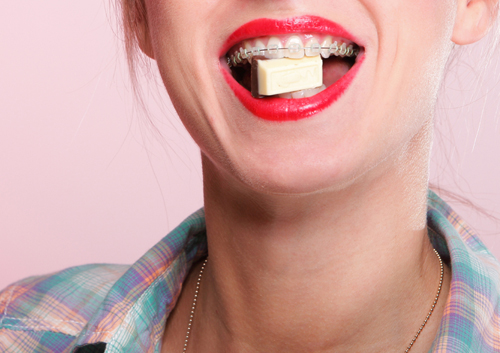April 27th, 2022

Sticky, hard, and gooey: these candies fill your dopamine receptors with spasms of sugar-filled joy, but if you’re undergoing orthodontic treatment at North Florida Orthodontic Specialists to straighten your teeth, then these sweets are not so sweet. While you may have a Willy-Wonka-sized sweet tooth, there are some candies you’re going to have to avoid while wearing braces.
Here are five bracket- and wire-destroying culprits that Dr. Barry and our team recommend leaving on the candy aisle and not put in your mouth, no matter how tempting they may be.
- Gum is sticky and stringy. It can get tangled like fishing net in your braces. You don’t want to be that boy or girl trying to pull knots of Wrigley’s out of your braces without being seen.
- All chewy, gooey candies need to be avoided. When you’re wearing braces, don’t even think about putting a caramel candy in your mouth. Caramel will not only stick to your braces, making it look as if you haven’t brushed your teeth in a week, but the gooey texture can pull apart the wires, and trigger an emergency visit to North Florida Orthodontic Specialists.
- Hard candy may seem like a safe choice, but it’s not. What’s the problem? Nobody ever just sucks on hard candy; sooner or later, we bite down on it. Biting a hard candy may cause part of your braces to snap. Furthermore, once the candy is broken into a bunch of little pieces, it’s not uncommon for one of those sugary shards to get wedged between your braces and teeth … and that’s a cavity waiting to happen.
- The taffy you enjoy getting at a seaside boardwalk is going to have to go on the back burner. Like caramel, taffy can pull apart and damage your braces. You don’t want to have your expensive orthodontic gear replaced.
- Please, just one lollipop? Nope. A lollipop is nothing more than hard candy on a stick. If you can’t have hard candy during orthodontic treatment, then you shouldn't have hard candy on a stick either.
Have any more questions about what you can and can’t eat when you have braces? Please give us a call at our convenient Tallahassee office to learn more, or ask Dr. Barry during your next adjustment visit!
April 20th, 2022

Dr. Barry and our team are excited to offer Invisalign Teen, a clear alternative to braces that’s just for teens! With Invisalign Teen, we are able to straighten your teen’s teeth without the hassle, discomfort, and embarrassment of traditional braces.
Invisalign Teen’s clear aligners are virtually invisible. What's more, they are removable, which means your child is free to eat anything they choose, as well as brush and floss with ease! And best of all, Invisalign Teen uses no wires or metal to straighten your teen's teeth.
Invisalign Teen aligners are made from a lightweight plastic material and fit precisely on the teeth. Invisalign Teen has become a popular treatment here at North Florida Orthodontic Specialists because it helps our younger patients achieve a straight, beautiful smile without their friends noticing.
Our team at North Florida Orthodontic Specialists is aware that most teens today have a busy lifestyle, and sometimes, they tend to lose things, including their retainers or aligners. But with Invisalign Teen, if your child happens to lose an aligner, let Dr. Barry and our team know as soon as possible and we will have the aligner replaced.
For more information on Invisalign Teen, please give us a call at our convenient Tallahassee office today!
April 13th, 2022

Many people undergo orthodontic treatment during childhood, adolescence, and even into adulthood. Wearing orthodontic appliances like braces is sure to produce a beautiful smile. Though orthodontic treatments at North Florida Orthodontic Specialists are designed to accommodate your lifestyle, chances are you will need to make some dietary modifications to prevent damage to your braces and prolong orthodontic treatment.
The First Few Days with Braces
The first few days wearing braces may be the most restrictive. During this time, the adhesive is still curing, which means you will need to consume only soft foods. This probably will not be a problem, however, as your teeth may be tender or sensitive while adjusting to the appliances.
Orthodontic Dietary Restrictions
You can eat most foods normally the way you did without braces. However, some foods can damage orthodontic appliances or cause them to come loose. Examples of foods you will need to avoid include:
- Chewy foods like taffy, chewing gum, beef jerky, and bagels
- Hard foods like peanuts, ice chips, and hard candy
- Crunchy foods like chips, apples, and carrots
How to Continue to Eat the Foods You Love Most
Keep in mind that you may still be able to enjoy some of the foods you love by making certain modifications to the way you eat them. For example, steaming or roasting carrots makes them softer and easier to consume with braces. Similarly, you can remove corn from the cob, or cut up produce like apples and pears to avoid biting into them. Other tips include grinding nuts into your yogurt or dipping hard cookies into milk to soften them. If you must eat hard candies, simply suck on them instead of biting into them.
If you have any question whether a food is safe to eat during your treatment with North Florida Orthodontic Specialists, we encourage you to err on the side of caution. Of course, you can always contact our Tallahassee office with any questions you have about your diet and the foods that should be avoided during treatment. By following our dietary instructions and protecting your orthodontic appliances from damage, you will be back to chewing gum in no time.
April 6th, 2022

Dr. Barry and our team at North Florida Orthodontic Specialists know that for some of our patients wearing braces, it can be difficult to weave through those wires and brackets as you brush and floss during your treatment.
Some of our patients use a water pick to flush out food and other particles and bacteria stuck between their teeth as the water can reach behind the metal wires and hit spots where your floss simply cannot reach. People suffering from gum disease also find water picks quite effective because of their ability to flush out bacteria from inside the deep pockets.
Water picks are friendly to braces and are also gentle on the gums. They are less likely to cause bleeding for people with sensitive teeth or gums. But as many benefits as they may have, Dr. Barry and our team want you to know that water picks should never be used as a substitute for flossing. Though they are great tools for helping improve oral health while you are in treatment, they are just not a good enough tool on their own to keep your mouth and gums gingivitis- and decay-free. Water picks are also incapable of removing plaque from teeth as effectively as floss can. While water picks rinse the sticky bacteria off your teeth, flossing is actually more effective as it actually scrapes the bacteria off of your pearly whites.
If you have any questions about water picks or any general questions or concerns about your orthodontic treatment, we encourage you to please ask us below or give us a call!







